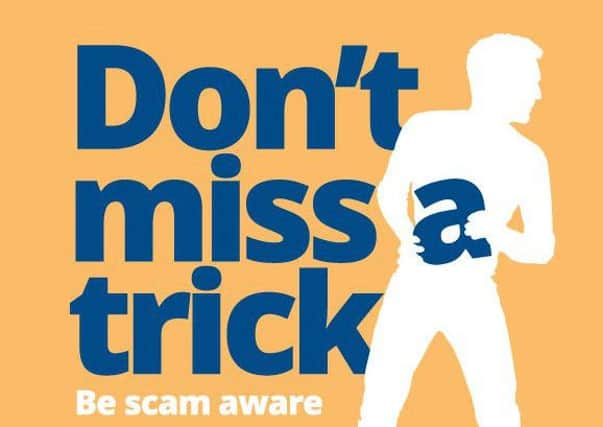Learn the tell-tale signs of a hoax


Scams aren’t just a minor inconvenience to people. Aside from financial loss, they can cause distress, misery, and even if a scam has been avoided, it can lead to a widespread loss of consumer confidence. They can also happen to anyone.
Citizens Advice Northumberland and Trading Standards are holding events across the county to help people know when they’ve been targeted in a scam.
Advertisement
Hide AdAdvertisement
Hide AdThe events are part of Scams Awareness Month in June, a national campaign encouraging people to report and talk about scams.
People will learn about the common signs of a scam, such as receiving an offer that sounds too good to be true or being told to pay an advance fee for an item or service.
Attendees will also be encouraged to report scams so that the police can take action and they can get advice on how to try to get their money back.
The events will take place on:
June 12 – Asda Store, Ashington
June 18 – Asda Store, Berwick
June 19 – Manor Walk Shopping Centre, Cramlington
June 22 – Sainsbury’s, Alnwick
Abi Conway, chief executive of Citizens Advice Northumberland, said: “Don’t miss a trick, be scams aware is our message to people.
Advertisement
Hide AdAdvertisement
Hide Ad“While there might be new scams cropping up all the time, the tactics of scammers remain the same. From getting contacted out of the blue to being pressured to sign up to a deal on the spot, our event will reveal the tell-tale signs of a scam that people need to keep an eye out for.
“While all of us can have the bad luck of being targeted in a scam, we hope these events will stop more scammers from running off with people’s money.”
To help stop more people being fleeced by these types of scams, Citizens Advice Northumberland is sharing tips on how to spot them:
Be suspicious if you’re contacted out of the blue, even if it’s from a name you recognise.
Advertisement
Hide AdAdvertisement
Hide AdDon’t be rushed – you never need to make a decision straight away.
If it sounds too good to be true, it probably is.
Never send money to someone you have never met.
Never give out your bank details unless you are certain you can trust the person contacting you.
Walk away from job adverts that ask for money in advance.
Genuine computer firms do not make unsolicited phone calls to help you fix your computer.
Suspect a scam? Hang up, wait five minutes to clear the line or use another phone to call.
Persuasive sales patter? Just say: “No thank you”.
Don’t suffer in silence – speak out about scams
Advertisement
Hide AdAdvertisement
Hide AdIf people are in doubt about whether or not an offer is genuine, they should contact the Citizens Advice consumer service or Citizens Advice Northumberland on 03444 111 444.
For opening times see www.citizensadvice.org.uk/northumberland and the Consumer Services Helpline on 03454 040506 (Monday to Friday, 9am to 5pm). Before you contact the helpline, you should have a pen and paper ready.
To help the adviser give you the most relevant advice, you should be ready to give them as much information as you can: brief details of your problem, such as when you paid for the item or the service, how much you paid, how you paid for it, whether you did so in a shop or online, the seller or trader’s name and address, what you’ve done to try to solve the issue, and your reference number if you’ve already contacted the helpline about the problem.
If people have been scammed they should report it to Action Fraud.